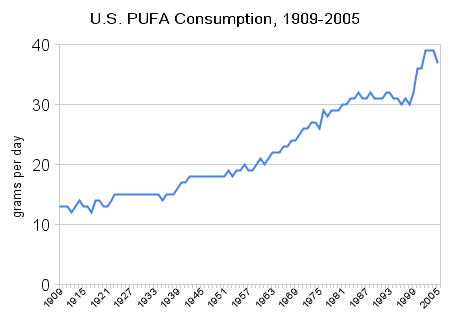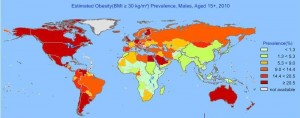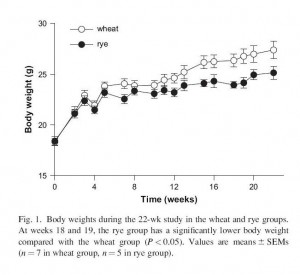Erich asked about the link between omega-6 fats and obesity. It’s a good question and also a good way to introduce the first step of the Perfect Health Diet weight loss program: removal of toxic foods from the diet.
Vegetable Oils With Fructose or Alcohol
These toxic foods are particularly dangerous in combination. We discuss this mix of toxins in the book (pp 56-59).
If you feed lab animals high doses of polyunsaturated fat (either omega-6 or omega-3 will do) along with high doses of either fructose or alcohol, then fatty liver disease develops along with metabolic syndrome. Metabolic syndrome is a major risk factor for obesity, and it’s not very difficult to induce obesity on these diets.
Both sugar and vegetable oils are individually risks for obesity:
- Stephan did a nice post a few years back, “Vegetable Oil and Weight Gain,” discussing a couple of studies showing that both rats and humans get fatter the more polyunsaturated fat they eat.
- Dr. Richard Johnson and colleagues did a review of the evidence for sugar (fructose) as a cause of obesity in the American Journal of Clinical Nutrition a few years ago. [1]
What the animal studies show us is that when fructose and vegetable oils are consumed together, they multiply each other’s obesity-inducing effects.
Here are a few pictures illustrating the correlation between polyunsaturated fat consumption, fructose consumption, and obesity.
Here is the Johnson et al chart showing historical fructose consumption in the UK and US [1]:

Here is Stephan’s chart showing historical polyunsaturated fat consumption in the US:

And here are obesity rates in the US:

Cereal Grains
It’s a common observation that the toxic grains, especially wheat, can produce a potbelly or “beer belly.” Rice doesn’t seem to do that.
There is epidemiological evidence for this effect. Here, for instance, is obesity prevalence by country from the World Health Organization Global Infobase:

Note the low obesity prevalence in the rice eating countries of China, India, Japan, Indonesia, and southeast Asia; and in sub-Saharan Africa, where a diversity of starch sources are eaten, including manioc/cassava, sorghum, millet, rice, maize, and wheat. The highest obesity prevalence is found in wheat-eating countries.
This correlation persists within countries. In the China Study, the correlation of wheat consumption with BMI was 56%, whereas the correlation of total calorie intake with BMI was only 13%. (Since total calorie intake is correlated with muscle mass, total calorie intake may be completely uncorrelated with fat mass. It’s not how much you eat, but how much wheat!)
Similar outcomes occur in mice. I can’t find any mouse studies comparing wheat to rice, but I did find one comparing wheat to rye [4]. Wheat was far more obesity-inducing than rye:

Body fat percentage was 20.2% in the wheat group, 13.7% in the rye group; fasting insulin was 126 pM in the wheat group, 90 pM in the rye group; and fasting cholesterol, triglycerides, and free fatty acids were higher in the wheat group.
In short: wheat made mice fatter, more insulin resistant, and more dyslipidemic than rye.
Just for fun here’s a picture comparing fat tissue in the rye (left) versus wheat (right) fed mice:

I believe that rice would have done even better than rye, but I was unable to find a paper directly comparing rice vs wheat or rye.
Why We Get Fat
This brings me to a point of difference with Gary Taubes. Although glucose is toxic in high doses, the body has an extensive machinery for disposing of excess glucose. As we discussed in our last post, all tissues of the body participate in glucose disposal. Dietary glucose is not likely to do much damage unless the body’s glucose-disposal machinery has been damaged by other toxins first.
Obesity is caused not by carb calories per se, but by natural plant toxins. Plants, not carbs, make you fat!
It’s possible, by the way, that differing toxicities among grains could be responsible for epidemiological evidence favoring “whole grains” over “refined grains.” In America, products made with refined grains are usually 100% wheat; but products made with whole grains are often of mixed origin (“7 grain bread”). Since wheat is the most obesity-inducing grain, dilution of wheat content may be masking the toxicity of whole grains.
Conclusion
Certain toxic foods seem to be very effective at causing obesity: vegetable oils, fructose, and wheat. Along with malnourishment (for instance, by choline deficiency) and infectious disease, food toxins are why we get fat.
The first step in any weight loss effort, therefore, ought to be removal of these toxic foods from the diet. Removing these toxins may not cure obesity; but without this step a cure is unlikely.
References
[1] Johnson RJ et al. Potential role of sugar (fructose) in the epidemic of hypertension, obesity and the metabolic syndrome, diabetes, kidney disease, and cardiovascular disease. Am J Clin Nutr. 2007 Oct;86(4):899-906. http://pmid.us/17921363.
[2] Andersson U et al. Metabolic effects of whole grain wheat and whole grain rye in the C57BL/6J mouse. Nutrition. 2010 Feb;26(2):230-9. http://pmid.us/19647415.











Hi Brandon,
Maybe it’s oxalates?
Might try eating lemon juice, see if that prevents it.
Is there nothing not covered here?
My pre-op urine tests (sample taken with a catheter) last Tuesday showed, “hazy” urine and “many” Squamous Epithelial. Doctor said that it might mean a urinary infection and he prescribed the antibiotic SMZ-TMP DS twice a day for three days. Then a follow-up test next Tuesday.
I won’t eat anything the morning of the test, but I wonder what you guys think I should eat the day before to make sure this condition isn’t caused by something I ate?
Again, thanks for your help.
Hi erp,
I only Googled and looked at one link, and didn’t stay at a Holiday Inn Express, so take this for what it’s worth:
This site, http://www.buzzle.com/articles/squamous-epithelial-cells-in-urine.html, says that squamous epithelial cells are a result of contamination of the urine sample by skin flakes. Therefore, nothing to worry about.
They say to avoid contamination, give your sample in the morning, and start collecting midstream, i.e. let the first bit go in the toilet.
This medical site agrees that they represent contamination: http://library.med.utah.edu/WebPath/TUTORIAL/URINE/URINE.html
Best, Paul
Thanks. It’s getting so I can’t remember life before the PHD.
Thank you for the wonderful blog and easy to read information! I am very happy to learn that rice (and potatoes) are safe starches to eat! It means I can go and make traditional nasi goreng (Malaysian fried rice) again mee hoon goreng (fried rice noodles).
A quick question regarding asian type of noodles. I recently bought some vermicelli type noodles and it’s made out of bean starch ( I think it’s mung bean). Is it OK? Or is it better to get rice noodles. They don’t seem to sell rice noodles at the supermarket here in Tokyo where I live at least.
Thank you!
Hi Wati,
I think rice noodles are better.
Beans have a lot of toxins in their raw state. They can sometimes be detoxified by overnight soaking and thorough cooking. With commercial products we don’t really know what they did to process the beans. Personally I avoid legume/bean products and stick with rice.
I’m sure you can find rice noodles in Tokyo!
Paul, thank you very much for the prompt response! Yes, I would have thought that rice noodles could be found easily in Japanese supermarket, but no. The traditional noodles here are udon and soba. Not that ideal for me because udon is wheat and soba is buckwheat (majority is a mixed of both wheat and buckwheat). I understand buckwheat is full of phytic acid, so I don’t eat soba, except when I make sourdough buckwheat pancakes (inspired from Stephan’s blog). Looks like I need to go and search for rice noodles at a Chinese shop.
However, I found another type of glass noodles made out potato starch. Is it safe?
I have been eating Paleo/Primal low carb for 1 and 1.5 years after giving birth to second child, and in recent months found that I actually feel much more satiated (albeit a little guilty) and feel full longer if I eat a little more carb like rice or potatoes, so I am extremely glad to have found your blog that says these are OK. So relieved that I don’t have that guilt baggage anymore following the conventional low carb eating.
Again, thank you so much for the brilliant research. I love the way you write, so scientific and yet so eloquent and easy to read that a layman like me to understands.
Thank you!
Hi Wati,
Thanks! I think it’s even more important for women to eat starches than men.
They may sell rice noodles as Pad Thai noodles or rice sticks. They must be available.
Best, Paul
I would like to know the toxin content of squashes and gourds. These are eaten quite a lot by tribal people around the world. I would love to try them. Do you have any information about them?
Thank you
Hi Susan,
I don’t have specific information but I think toxin levels are low. In general, fruits are low in toxicity, and low-calorie shelled plant foods are low in toxicity.
So I would hold them innocent of all sin until evidence turns up otherwise!
Last night, I watched Alton Brown’s beyond excellent show, “Good Eats,” featuring Asian noodles. He doesn’t boil them, just soaks them in hot/warm water for 10-20 minutes, drains them thoroughly and uses them in whatever dish he’s making.
This might do the trick for us. Both the CG and I like dishes with plain white rice better than trying to use rice noodles as a substitute for Italian style pasta. Asian noodles may look something like linguini, but they don’t taste like it at all. Clam sauce over rice is yummy, clam sauce over rice linguini not so much.
Hi erp,
That’s a great idea. Rice noodles cook so quickly, it’s so easy to overcook them. Cooler water might be just the trick.
i am at the age of 27male with height 5.9ft & weight 50kg. is there any food supliment ya tips which will help me to get perfect bodyweight of 70kg. if any kindly provide me.
thanx
Hi Baba,
If you’re healthy: Eat sufficient carbs and protein; perhaps 1000 calories total, around 600 carb and 400 protein would be good. Be well nourished (eg multivitamin, our other recommended supplements). This will promote bone density and tissue gain. Over-feed: force yourself to eat extra calories, with a focus on tasty and enjoyable food. Have extra dessert. Do resistance exercise. Take branched-chain amino acid supplements/leucine and perhaps creatine.
Above all, cure any chronic infections. If the inability to gain weight is due to infection, then you’ll need diagnosis based on symptoms and tests.
Best, Paul
Hi Paul, I love your blog, about carbohydrates, I have to say about myself after several months of following a low carb diet without fruits and other starches, the result: was weight gain, constipation, low energy, now I do not measure the amounts of carbohydrates and eat large quantities of fruit and starches such as sweet potatoes, bananas, yuca … result? less weight, no abdominal discomfort, more energy, less belly 🙂
Hi Luisa,
Fascinating. I’m glad that you got off the zero-carb diet – those are always unhealthy – and are doing well with more carbs.
One thing to be aware of is that your response to very low carb dieting might indicate a parasitic (protozoal or worm) infection. You might want to ask your doctor to do a diagnostic test.
Thanks for sharing!
Best, Paul
Paul, could you provide a (possible) mechanism through which fructose/wheat promote weight gain? Do they make people to increase their total calorie intake? Or do the operate on calories burning systems in the body (like the thyroid ot thermogenetic processes)? Would a person eating a diet high in fructose and wheat gain weight on the exactly same number of calories and the same activity level that won´t make him gain on a low toxin diet? I do not doubt your findings but I am interested in the mechanism!
Hi Iris,
Fructose is a little easier, in combination with polyunsaturated fats it causes fatty liver disease which promotes obesity; also it is a “useless macronutrient” and I’ll blog about how that promotes obesity in the New Year.
Wheat’s mechanisms are more mysterious. We need some research to help us with that one.
Obesity is a multifactorial disease so generally the effects are greatest in combination with other factors.
Best, Paul
Gary Taubes says “what makes us fat is also making us sick”.
To which I feel like adding, “even if it doesn’t make us fat”.
Good line, George. I agree.
By your logic, I should be overweight. There have been periods of time in my life where those oh-so-nasty legumes have composed at least anywhere from 20% to 30% of my calories; this corresponds to eating, for example, .25 to .5 pounds of black beans a day. And get this: I was drinking one to three 20 ounce bottles of sugar sweetened (not HFCS!) per day. During one of these periods, I went from very active to almost sedentary, which is always an excellent litmus test of whether a diet will induce weight gain or not. Guess what? No weight gain.
Hence, in my anecdotal experience, your theory is incomplete. Yes, anecdotal experience matters: It can call into question ideas and theories by showing they are not not complete and lack the ability to explain every case.
You seem to have misunderstood the article. By his logic you should NOT gain weight. You wrote “not HFCS”, and you don’t mention any veggie oil.. Aparently fructose+oil will cause weight gain (if you eat enuff calories of course..) and also risk of fatty liver (and possibly diabetes, acording to other sites) ….my family has diabetes, and i want to gain weight, but since i want to avoid diabetes, i want to avoid sugar+oil (the easiest way to gain weight ..but also disease ..and stomach pain in my case)
Paul,
Talking about fructose, what do you think about orange juice as a regular drink replacing fruits in the daily diet ? Unfortunately, I’ve experienced bad issues with fruits in my daily diet. Lemon juice and orange juice seem to be a good alternative but is it a good choice on a long term diet, and how much would you recommend for not having excess fructose while eating starches and sugary plants in the diet ?Best, and Thanks,Maya
Hi Maya,
I’m not a fan of calorie-containing beverages, but if that’s what your digestive tract will tolerate, as a temporary measure it’s tolerable. Just keep omega-6 levels down…. You could also make your own drink with glucose flavor, eg rice syrup or tapioca syrup in tea or hot water with lemon juice.
Interestingly, India (mostly North India) consumes a lot of wheat. And sadly, when people here are trying to lose weight, they often go for roti (wheat bread) instead of rice, thinking that they are somehow healthier.
“Here is Stephan’s chart showing historical polyunsaturated fat consumption in the US”
Hi Paul,
Do you have a link to where I can find this↑ chart please.
I’ve had no luck searching the web for it.
Thx
Hi Darrin,
The data is undoubtedly from the USDA ERS. You can find the same data charted in Figure 2 of this paper: https://www.ncbi.nlm.nih.gov/pmc/articles/PMC8805510/. Direct link: https://www.ncbi.nlm.nih.gov/pmc/articles/PMC8805510/figure/F2/.
Best, Paul
Thanks